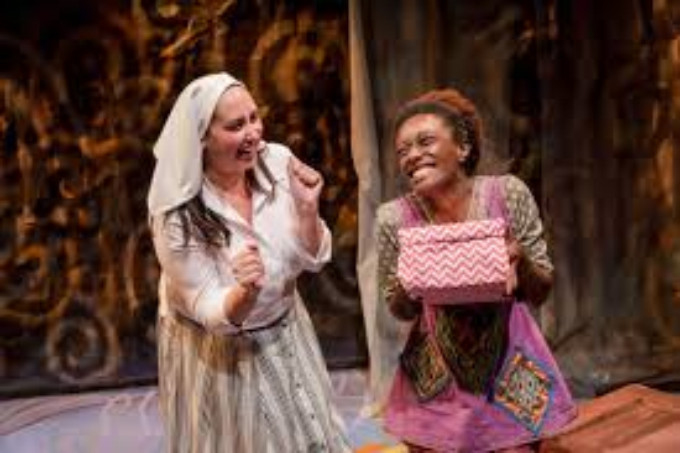Review: THE ADVENTURES OF THE BLACK GIRL IN HER SEARCH FOR GOD is Less Than it Could be at Karamu

George Bernard Shaw's views on religion may be summarized by his statement, "People believe anything that amuses them, gratifies them, or promises some sort of profit."
He showcased his anti-organized religion and doubt of God in his "The Adventures of a Black Girl in Her Search for God," a novella he wrote after returning from five weeks in Africa in the winter of 1932. He imagined a young black girl roaming the "darkest of Africa" in search of God.
His story was adapted for the stage by African-American writer, Lisa Codrington.
A staging of Codrington's script is now on stage at Karamu.?? "The Adventures of a Black Girl in Her Search for God" tells the tale of an African girl who has been abandoned by her missionary for asking too many question about God, religion and philosophy that the church proselytizer couldn't answer.Left on her own, The Black Girl sets out on her own mission to find God, since she has been taught, "Seek and you shall find me," which she takes to mean, "seek out and actually speak to God."?
In the Shaw essay the Black Girl meets a vengeful deity of the early books of the Bible, a philosophical version as exposed in the "Book of Job," and two versions of Jesus...a kindly but ineffective young man and another posing as an artist who is depicting Christ on the cross.
Eventually we, like the Black Girl, come to the conclusion that, "There are a lot of old men pretending to be gods in this forest [the world]."?
She also meets an atheist-behaviorist, and others who explain that the speculations about God are passé. She finally is confronted by an elderly man who persuades her to abandon her quest and settle down "with a red-haired Irishman and rear a charmingly coffee-colored family." (Note: at one point in his writing career, Shaw started a general furor by proposing intermarriage between blacks and whites as a solution to racial problems in South Africa.)??
My evaluation of the Shaw production of the script was, "staging is illuminating, delightful and the standing ovation was well deserved."
I wish I could say the same for the Karamu production; but, I can't. Shaw calls the play a comedy with satirical overtones. Unfortunately, in spite of a strong performance by India Pierre-Ingram as the Black Girl, the Karamu production misses the mark.Presented as a farce with slapstick, double takes, and overdone characterizations running wild, Shaw's messages get lost in the mayhem. In spite of the over the top screaming, over-acting and begging for laughs, few guffaws were heard.
The director and cast had another issue to contend with at the "joyful gathering place." When Shaw published "Black Girl" in 1932, it was so controversial that, probably much to his delight, he was decried as a "blasphemer." The Shaw Festival audience, many of whom were religiously liberal Canadians, took the Irishman's satire as such. However, the Karamu audience, many of whom are devout Christians, were not amused by the overdrawn depictions of the men of the "Bible," the simpering Jesus's, and the mindless prophets. An elderly woman, sitting diagonal to me, had a stressed look on her face from the start of the second scene on. At the end there was no applause from her, and she reached out and took my hand as I went to exit and said, "God is not happy!" The show was definitely not an appropriate happy 90 th birthday present for her! From the exit conversations, unfortunately, she was not alone in her dislike of the subject matter.
?Capsule judgment: The commentary, "The Adventures of a Black Girl in Her Search for God," as evidenced at the Shaw Festival, can be a compelling hour production. Unfortunately, in spite of a valiant effort, this isn't the case at Karamu.
Reader Reviews

Videos

